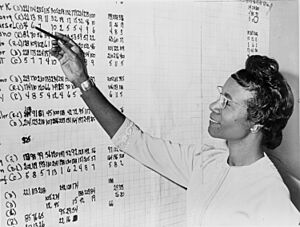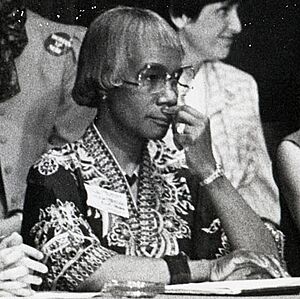Shirley Chisholm facts for kids
Quick facts for kids
Shirley Chisholm
|
|
|---|---|
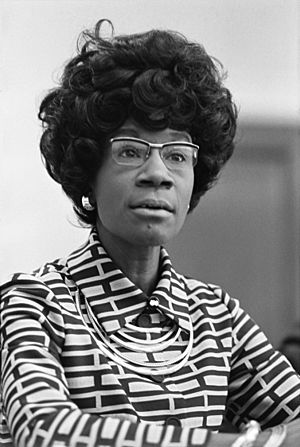 |
|
| Secretary of the House Democratic Caucus | |
| In office January 3, 1977 – January 3, 1981 |
|
| Leader | Tip O'Neill |
| Preceded by | Patsy Mink |
| Succeeded by | Geraldine Ferraro |
| Member of the U.S. House of Representatives from New York's 12th district |
|
| In office January 3, 1969 – January 3, 1983 |
|
| Preceded by | Edna Kelly |
| Succeeded by | Major Owens |
| Member of the New York State Assembly |
|
| In office January 1, 1965 – December 31, 1968 |
|
| Preceded by | Thomas Jones |
| Succeeded by | Thomas R. Fortune |
| Constituency | 17th district (1965) 45th district (1966) 55th district (1967–1968) |
| Personal details | |
| Born |
Shirley Anita St. Hill
November 30, 1924 New York City, New York, U.S. |
| Died | January 1, 2005 (aged 80) Ormond Beach, Florida, U.S. |
| Resting place | Forest Lawn Cemetery |
| Political party | Democratic |
| Spouses | Conrad Chisholm (m. 1949; div. 1977) Arthur Hardwick, Jr.(m. 1977; his death 1986) |
| Education | Brooklyn College (BA) Columbia University (MA) |
Shirley Anita St. Hill Chisholm (November 30, 1924 – January 1, 2005) was an American politician, educator, and writer. She made history as the first African-American woman elected to the United States Congress. Shirley Chisholm was a strong supporter of women’s rights, civil rights, and education. She inspired many people with her bravery and determination.
In 1972, Chisholm ran for President of the United States as a Democrat. She was the first major-party Black candidate to seek the presidency.
Contents
Early Life and Education
Shirley Anita St. Hill was born on November 30, 1924, in Brooklyn, New York. Her parents were immigrants from Barbados. Her father, Charles St. Hill, worked in a factory. Her mother, Ruby Seale St. Hill, was a seamstress.
When Shirley was young, from age three to eleven, she lived in Barbados. She stayed with her grandmother there and went to a one-room schoolhouse. This early education helped her become very good at reading and writing. She learned to speak both English and Bajan Creole, which is a local language in Barbados.
After returning to Brooklyn, she did very well in school. She graduated from Girls' High School in 1942. Then she went to Brooklyn College. In 1946, she graduated with honors. She earned a Bachelor of Arts degree in sociology and also studied Spanish.
Early Career and Education
After college, Shirley Chisholm started working as a teacher's aide. She worked at the Mt. Calvary Child Care Center in Harlem from 1946 to 1953. While working, she continued her education. She took classes at night and earned her Master of Arts degree in childhood education. She received this degree from Teachers College of Columbia University in 1951.
For several years, she worked as an educational consultant. She helped improve the quality of education for young children in daycare centers in New York City. She truly believed that all children should have access to good education, no matter where they came from.
Entering Politics
Chisholm decided to enter politics in 1953. She noticed that there were not many women or people of color in important leadership roles. She wanted to change this situation.
In the 1960s, she became more involved with the Democratic Party. She joined different political groups. She also worked on campaigns for other candidates. This helped her learn a lot about how politics worked and how to get things done.
In 1964, she ran for a seat in the New York State Assembly and won. This was a big step for her. She represented her district in Brooklyn. She worked on important issues for her community, such as education, housing, and jobs.
Election to Congress
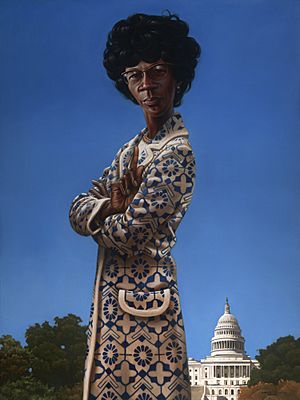
In 1968, Shirley Chisholm decided to run for the United States House of Representatives. She ran in New York's 12th congressional district. This district was mainly made up of Black residents in Brooklyn.
Her campaign was difficult. She faced many challenges, including sexism and racism. Some people thought a Black woman could not be a successful politician. But Shirley Chisholm was determined to prove them wrong.
She ran a "grassroots" campaign. This means she relied on the support of everyday people. She went door-to-door, talking to voters and listening to their worries. She promised to fight for their interests in Congress.
On Election Day, November 5, 1968, Shirley Chisholm won the election! She became the first Black woman ever elected to Congress. This was a very important moment for the United States.
Time in Congress
Shirley Chisholm served in the House of Representatives for seven terms. She was in Congress from 1969 to 1983. She was a strong and clear voice for the people she represented. She fought for the rights of women, minority groups, and people who were poor.
She was placed on the House Committee on Education and Labor. Here, she worked on laws to make education better, create jobs, and protect workers' rights. She also served on the Veterans' Affairs Committee. On this committee, she supported the needs of military veterans.
One of her most important achievements was her work on the Special Supplemental Nutrition Program for Women, Infants, and Children (WIC). This program helps low-income pregnant women, new mothers, and young children by providing food and healthcare. It has helped millions of families across the country.
Shirley Chisholm was known for being independent. She was also known for speaking her mind. She often challenged old ways of doing things. She fought for what she believed was right. She was a role model for many people, especially women and people of color.
Presidential Campaign
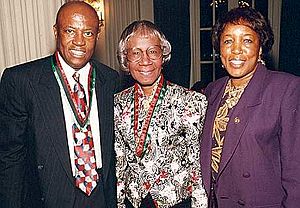
In 1972, Shirley Chisholm made history again. She ran for President of the United States. She was the first Black woman to seek a major political party's nomination for president.
Her campaign was a long shot, meaning it was unlikely to win. She faced many difficulties. These included not having enough money and not getting much support from the Democratic Party leaders. But she was determined to run a campaign that would inspire people. She also wanted to bring up important issues.
She traveled all over the country. She spoke to voters and shared her ideas for America. She talked about the need for fairness in society and the economy. She also spoke about ending the Vietnam War and creating a more welcoming society for everyone.
Even though she did not win the Democratic nomination, her campaign was successful in many ways. She showed that a Black woman could run for president and be taken seriously. She inspired a new generation of activists and leaders.
Legacy and Death
Shirley Chisholm left a lasting impact on American politics and society. She broke down barriers. She also made it easier for other women and people of color to enter politics. She showed that anyone, no matter their background, can make a difference in the world.
After leaving Congress in 1983, she taught at Mount Holyoke College and Spelman College. She continued to speak out on important issues. She also inspired young people to get involved in politics.
Shirley Chisholm passed away on January 1, 2005, at the age of 80. But her legacy continues. She is remembered as a trailblazer, a champion for justice, and a role model for all.
Shirley Chisholm's story reminds us that anything is possible. You can achieve your dreams if you work hard and believe in yourself. She showed the world that with courage, determination, and a commitment to fairness, you can make a difference in the lives of others.
Interesting Facts About Shirley Chisholm
- Shirley had three younger sisters.
- Even though she was born in the U.S., Chisholm always considered herself a Barbadian American.
- Because she lived in Barbados as a child, she spoke with a West Indian accent her whole life.
- Chisholm said that during her time in the New York state legislature, she faced more unfair treatment for being a woman than for being Black.
- When she ran for the United States House of Representatives, her campaign slogan was "Unbought and unbossed." This meant she couldn't be bought or controlled by others.
- President Bill Clinton wanted her to be the ambassador to Jamaica. However, she could not take the job because of her health.
- In 1993, she was honored by being added to the National Women's Hall of Fame.
- In 2005, a documentary film about her, Shirley Chisholm '72: Unbought and Unbossed, was shown on U.S. public television. It won a Peabody Award in 2006.
- In 2015, she was given the Presidential Medal of Freedom by President Barack Obama. This is the highest award a civilian can receive in the United States.
Shirley Chisholm Quotes
- "Service is the rent that you pay for room on this earth."
- "I have never cared too much what people say. What I am interested in is what they do."
- "I am and always will be a catalyst for change."
- "I love America not for what she is, but for what she can become."
- "You don't make progress by standing on the sidelines, whimpering and complaining. You make progress by implementing ideas."
- "Don't listen to those who say you can't. Listen to the voice inside yourself that says, I can."
Images for kids
-
Chisholm (seated, second from right) with other founding members of the Congressional Black Caucus in 1971.
See also
 In Spanish: Shirley Chisholm para niños
In Spanish: Shirley Chisholm para niños
 | Delilah Pierce |
 | Gordon Parks |
 | Augusta Savage |
 | Charles Ethan Porter |


